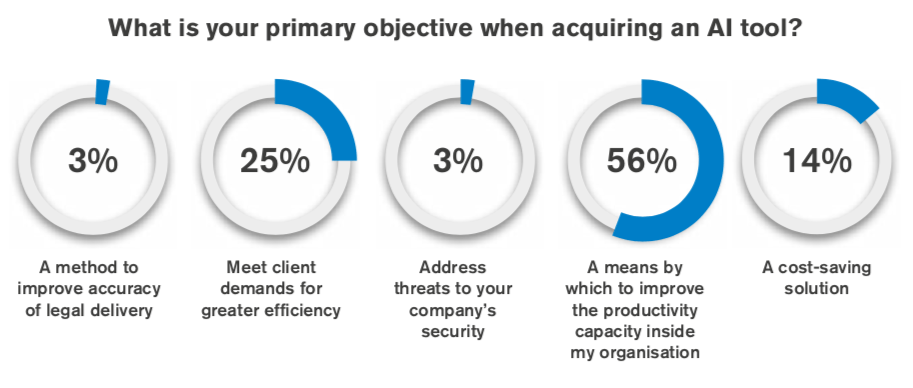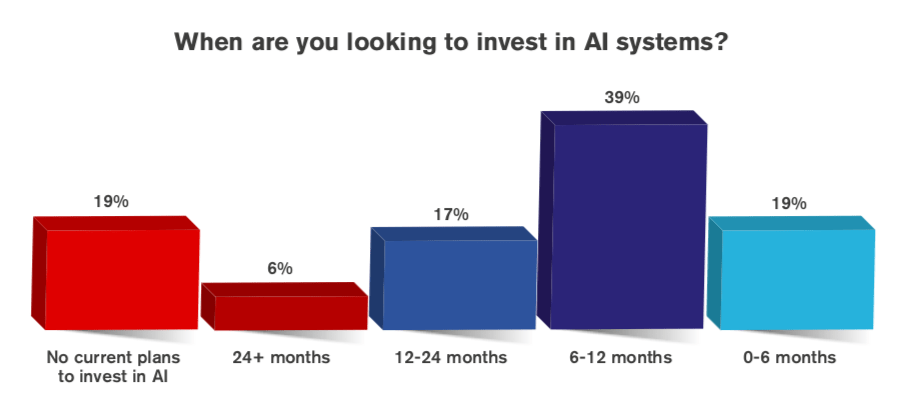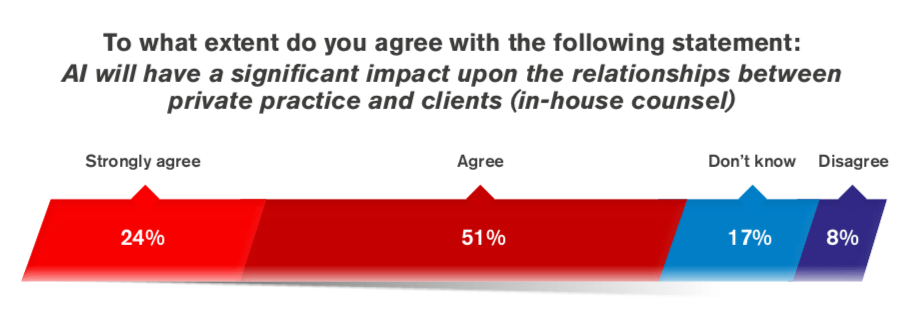
A recent survey of lawyers focused on legal AI and automation technology has shown a range of positive and realistic views from the sector, suggesting that firsthand experience of the technology is growing and an optimistic, but practical and business-focused outlook about AI is now emerging.
In fact, one could say that far from being stuck in the Gartner Hype Cycle’s ‘Trough of Disillusionment’ following the end of the peak hype stage last year, we are now well and truly climbing up the ‘Slope of Enlightenment’, i.e. the path all new technologies take toward real and substantive market adoption.
The survey by IQPC, ahead of its Legal AI Forum event later this year (18 -19 September in London), gathered feedback from around 200 legal professionals and the following is what they found:
- The biggest driver for the use of AI and automation is to increase productive capacity, (see below), that is to say, to increase the overall capability of the firm, or inhouse team, to do more work. Also, although not mentioned in the responses, by being able to do more, this will tend to mean a group of lawyers being able to automate more process level tasks and in turn be more productive when it comes to focusing on higher level, more complex matters. In short, get more done, where it matters most. Interestingly, cost alone was not the biggest driver, nor was efficiency – although improvements to both would be directly linked to any increase in productivity nevertheless. It’s especially positive to see how lawyers see the use of AI and automation as very much an economic and business issue – which fundamentally it is, as it changes ‘the means of production’. We can discuss the technical aspects of AI, or its impact on data analysis, for as long as we like, but ultimately this is about economics and productivity, or, as Artificial Lawyer likes to put it, ‘the industrialisation of the law’.
- Less than 20% of the survey group said they had no plans to take up an AI system, with 58% planning to do so within the next 12 months. This is a significant change on just two years ago, when the numbers probably would have been reversed. This tells us two things: that making use of automated systems is now ‘normal’ in the legal world, at least in the larger scale commercial legal sector; and secondly, that perhaps incredibly there are still a small, but notable group of lawyers who are risking strategic and operational challenges by not engaging with this technology. Clearly there are still some ‘holdouts’ that risk getting left behind.
- Lack of knowledge about what AI/automation systems are and can do is the main barrier to adoption, according to the survey. This is perhaps not a surprise, given that some lawyers tend not to focus on new technology – though many now do. Although given the huge wave of information on this subject in recent years it is a little concerning and suggests that too much of the information about AI is not being digested by law firm management/General Counsel. Although a relatively small number, 26% still said they lacked knowledge of what was out there, even though many sites such as this one maintain a constant feed of news and product descriptions. Also, 24% said ‘the technology is not advanced enough’, which also suggests what would appear to be a misunderstanding of what the tech does. I.e. the only way one could view NLP/ML doc review systems, for example, as ‘not advanced enough’, would be if you were expecting some kind of ‘silver bullet’ solution such as one sees in films. NLP/ML systems need training and plenty of human input, and it’s perhaps again a lack of knowledge around these aspects by some lawyers that has led to the above view. Also, 17% of lawyers said they didn’t see how they could apply the technology, even though again there are now dozens of AI/automation companies offering a wide range of tools across multiple practices and use cases. That said, overall, the numbers who didn’t have knowledge were low overall, suggesting that many do now have sufficient information to make informed choices. But, clearly there is more work to be done on the educational front.
- 75% of lawyers believe that AI/automation technology will change the relationship between firms and clients. One reason for this may be that as external and internal lawyers work together to process and analyse the client’s legal data with AI tools, then the relationship could become more collaborative. I.e. it makes more sense for the client to work on a more continual basis with law firms to help them gain insights into their legal data/contract stack as it grows, changes, evolves and faces constantly changing insight needs. The relationship could also change if clients see most process work as something they could automate themselves, rather than use a law firm, and then this could see even more work taken inhouse, rather than sent to law firms or perhaps sent out to LPOs and ALSPs with AI tools.
Overall, a positive outlook, though as seen above, especially around the level of specific knowledge regarding certain AI applications and how best to use them, there is still some work to be done.
The findings of the report, and much more besides, will be discussed during the two-day Legal AI Forum event. Yours truly will be Chairman for the event, and a host of great speakers will be taking part, including: Karyn Harty, Partner, McCann Fitzgerald; Jonathan Patterson, Managing Director & Head of Development, DWF; and Christina Blacklaws, Vice President,The Law Society of England and Wales; and many more.



Oo